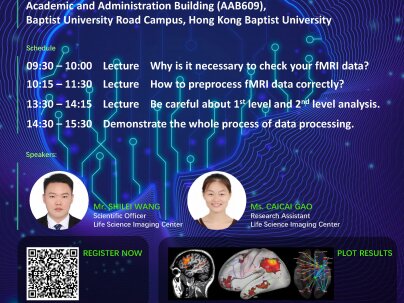
Big Data Analytics in Biomedical Informatics
31Jul
Speaker

Prof. Hesham H. Ali
Director of UNO Bioinformatics Core Facility
College of Information Science and Technology
University of Nebraska at Omaha
USA
Time
1400-1500, 31 Jul 2018
Venue
iCafé Activities Room (next to Pacific Coffee), 3/F, Wing Lung Bank Building, Shaw Campus
Abstract
With the increasing number and sophistication of biomedical instruments and data generation devices, there is even more increasing pressure on researchers to develop advanced data analytics tools to extract useful knowledge out of the massive collected data. This includes advanced sequencing technologies responsible for the generation of huge amounts of bioinformatics data as well as wearable devices and Internet of Things systems responsible for collecting different types of health and mobility related data. The currently available data is not only massive in size but it also exhibits all the features of big data systems with a high degree of variability, veracity and velocity. How to leverage this raw data to advance biomedical research, particularly in dealing with outbreaks and infectious diseases, and improve health care, through personalized and targeted medicine, can be considered the most exciting scientific challenge of our generation. Developing innovative data integration and mining techniques along with clever parallel computational methods to implement them will be critical in efficiently meeting those challenges and take advantage of the potential opportunities. This talk present new big data analytics tools using graph modeling and network analysis along with how to effectively utilize High Performance Computing in implementing such tools. Case studies illustrating how proposed tools were used to analyze data associated with infectious diseases that led to new biological discoveries will also be presented.
Biography
Hesham H. Ali is a Professor of Computer Science and Lee and Wilma Seemann Distinguished Dean of the College of Information Science and Technology at the University of Nebraska at Omaha (UNO). He also serves as the director of the UNO Bioinformatics Core Facility that supports a large number of biomedical research projects in Nebraska. He has published numerous articles in various IT areas including scheduling, distributed systems, data analytics, wireless networks, and Bioinformatics. He has also published two books in scheduling and graph algorithms, and several book chapters in Bioinformatics. He has been serving as the PI or Co-PI of several projects funded by NSF, NIH and Nebraska Research Initiative in the areas of data analytics, wireless networks and Bioinformatics. He has also been leading a Research Group that focuses on developing innovative computational approaches to classify biological organisms and analyze big bioinformatics data. The research group is currently developing several next generation big data analytics tools for mining various types of large-scale biological and medical data. This includes the development of new graph theoretic models for assembling short reads obtained from high throughput instruments, as well as employing a novel correlation networks approach for analyzing large heterogeneous biological and health data associated with various biomedical research areas, particularly projects associated with aging and infectious diseases. He has also been leading two funded projects for developing secure and energy-aware wireless infrastructure to address tracking and monitoring problems in medical environments, particularly to study mobility profiling for healthcare research.





